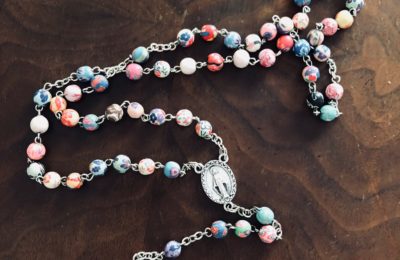Good Monday morning to you all from the rolling hills of the Ohio Valley. Today is another St. Alphonsus day where I will post an excerpt from The Glories of Mary. I continue to be amazed at the work this 18th century Doctor of the Church put into this book; and it, seems to me, that its richness can only be taken in small pieces.
Today’s slice of this book-cake, is the section where St. Alphonsus delves into the theme of Our Lady, the Hope of All. So without further ado, grab your morning coffee, and let us hear what this saint has to tell us on this happy subject:
Modern heretics cannot endure that we should salute and call Mary our hope: “Hail, our Hope!” They say that God alone is our hope; and that He curses those who put their trust in creatures in these words of the prophet Jeremias: “Cursed be the man that trusteth in man” (Jeremias 17:5). Mary, they exclaim, is a creature; and how can a creature be our hope? This is what the heretics say; but in spite of this, the holy Church obliges all ecclesiastics and religious each day to raise their voices, and in name of all the faithful invoke and call Mary by the sweet name of “our Hope,”—the hope of all.
The angelical Doctor, St. Thomas Aquinas, says (IIa-IIae, q. 25, art. 1, ad 3), that we can place our hope in a person in two ways: as a principal cause, and as a mediate one. Those who hope for a favor from a king, hope it from him as lord; they hope for it from his minister, or favorite, as an intercessor. If the favor is granted, it comes primarily from the king, but it comes through the instrumentality of the favorite; and in this case he who seeks the favor is right in calling his intercessor “his hope”. The King of Heaven, being infinite goodness, desires in the highest degree to enrich us with His graces; but because confidence is requisite on our part, and in order to increase it in us, He has given us His own Mother to be our mother and advocate, and to her He has given all power to help us; and therefore He wills that we should repose our hope of salvation and of every blessing in her.
Those who place their hopes in creatures alone, independently of God, as sinners do, and in order to obtain the friendship and favor of a man, fear not to outrage His divine Majesty, are most certainly cursed by God, as the prophet Jeremias says. But those who hope in Mary, as Mother of God, who is able to obtain graces and eternal life for them, are truly blessed and acceptable to the Heart of God, Who desires to see that greatest of His creatures honored; for she loved and honored Him in this world more than all men and angels put together. And, therefore, we justly and reasonably call the Blessed Virgin our hope, trusting, as Cardinal Bellarmine says, “that we shall obtain, through her intercession, that which we should not obtain by our own unaided prayers.” “We pray to her,” says the learned Suarez, “in order that the dignity of the intercessor may supply for our own unworthiness; so that”, he continues, “to implore the Blessed Virgin in such a spirit, is not diffidence in the mercy of God, but fear of our own unworthiness” (De Inc. p. 2, d. 23, s. 3).
It is, then, not without reason that the holy Church, in the words of Ecclesiasticus, called Mary the Mother of holy Hope (Eccliasticus 24:24). She is the mother who gives birth to holy hope in our hearts; not to the hope of the vain and transitory goods of this life, but of the immense and eternal goods of heaven.
“Hail, then, O hope of my soul!” exclaims St. Ephrem, addressing this divine Mother; “hail, O certain salvation of Christians; hail, O helper of sinners; hail, fortress of the faithful and salvation of the world!” Other saints remind us, that after God, our only hope is Mary; and therefore they call her, “after God, their only hope” (Cant. p. Psalt).
St. Ephrem, reflecting on the present order of Providence, by which God wills (as St. Bernard says, and as we shall prove at length) that all, who are saved, should be saved by the means of Mary, thus addresses her: “O Lady, cease not to watch over us; preserve and guard us under the wings of thy compassion and mercy, for, after God, we have no hope but in thee”( De Laud. Dei Gen.). St. Thomas of Villanova repeats the same thing, calling her “our only refuge, help, and asylum” (In Nat. B. V. Conc. 3). St. Bernard seems to give the reason for this when he says, “See, O man, the designs of God,—designs by which he is able to dispense his mercy more abundantly to us; for, desiring to redeem the whole human race, he has placed the whole price of redemption in the hands of Mary, that she may dispense it at will” (De Aquaed).
In the book of Exodus we read that God commanded Moses to make a mercy-seat of the purest gold, because it was thence that He would speak to him. Thou shalt make also a propitiatory of the purest gold . . . Thence will I give orders, and will speak to thee (Exododus 25:17). St. Andrew of Crete says that “the whole world embraces Mary as being this propitiatory.” And commenting on his words a pious author exclaims, “Thou, O Mary, art the propitiatory of the whole world. From thee does our most compassionate Lord speak to our hearts; from thee He speaks words of pardon and mercy; from thee He bestows His gifts; from thee all good flows to us” (Paciucch. in Sal. Ang. Exc. 20).
And therefore, before the divine Word took flesh in the womb of Mary, He sent an archangel to ask her consent: because He willed that the world should receive the Incarnate Word through her, and that she should be the source of every good. Hence St. Irenaeus remarks, that as Eve was seduced, by a fallen angel, to flee from God, so Mary was led to receive God into her womb, obeying a good angel; and thus by her obedience repaired Eve’s disobedience, and became her advocate, and that of the whole human race. “If Eve disobeyed God, yet Mary was persuaded to obey God, that the Virgin Mary might become the advocate of the virgin Eve. And as the human race was bound to death through a virgin, it is saved through a Virgin” (Cont. B. M. in prol.).
The devout Blosius, then, might well exclaim, “O Mary, O though who art so loving and gracious towards all who love thee, tell me, who can be so infatuated and unfortunate as not to love thee? Thou, in the midst of their doubts and difficulties, enlightenest the minds of all who, in their afflictions, have recourse to thee. Thou encouragest those who fly to thee in time of danger; thou succorest those who call upon thee; thou, after thy divine Son, art the certain salvation of thy faithful servants. Hail, then, O hope of those who are in despair, O succor of those who are abandoned. O Mary, thou art all-powerful; for thy divine Son, to honor thee, complies instantly with all thy desires” (Par. An. p. 2, c. 4).
St. Germanus, recognizing in Mary the source of all our good, and that she delivers us from every evil, thus invokes her: “O, my sovereign Lady, thou alone art the one whom God has appointed to be my solace here below; thou art the guide of my pilgrimage, the strength of my weakness, the riches of my poverty, remedy for the healing of my wounds, the soother of my pains, the end of my captivity, the hope of my salvation! Hear my prayers, have pity on my tears, I conjure thee, O thou who art my queen, my refuge, my love, my help, my hope and my strength” (Encom. In S. Deip.).
We need not, then, be surprised that St. Antoninus applies the following verse of the Book of Wisdom to Mary: “Now all good things came to me together with her” (Wisdom 7:11). For as this Blessed Virgin is the Mother and dispenser of all good things, the whole world, and more particularly each individual who lives in it as a devout client of this great Queen, may say with truth, that with devotion to Mary, both he and the world have obtained everything good and perfect. The saint thus expresses his thought: “She is the Mother of all good things, and the world can truly say, that with her (that is, the most Blessed Virgin ) it has received all good things” (P. 4, l. 15, c. 20, #12). And hence the Blessed Abbot of Celles expressly declares, “that when we find Mary, we find all” (De Cont. de V. M. in Prol.). Whoever finds Mary finds every good thing, obtains all graces and all virtues; for by her powerful intercession she obtains all that is necessary to enrich him with divine grace. In the Book of Proverbs Mary herself tells us that she possesses all the riches of God, that is to say, his mercies, that she may dispense them in favor of her lovers. “With me are riches . . . and glorious riches . . . that I may enrich them that love me (Proverbs 8:18). And therefore St. Bonaventure says: “That we ought all to keep our eyes constantly fixed on Mary’s hands, that through them we may receive the graces that we desire” (Spec. B. V. lect. 3)”).
O, how many, who were once proud, have become humble by devotion to Mary! How many who were passionate have become meek! how many in the midst of darkness have found light! How many who were in despair have found confidence! How many who were lost have found salvation by the same powerful means! And this she clearly foretold in the house of Elizabeth, in her own sublime canticle: “Behold, from henceforth all generations shall call me blessed.” And St. Bernard, interpreting her words, says: “All generations call thee blessed, because thou has given life and glory to all nations, for in thee sinners find pardon, and the just perseverance in the grace of God” (In Pent. s. 2).
Hence the devout Lanspergius makes our Lord thus address the world: “Men, poor children of Adam, who live surrounded by so many enemies and in the midst of so many trials, endeavor to honor my Mother and yours in a special manner: for I have given Mary to the world, that she may be your model, and that from her you may learn to lead good lives; and also that she may be refuge to which you can fly in all your afflictions and trials. I have rendered this, my daughter, such that no one need fear or have the least repugnance to have recourse to her; and for this purpose I have created her of so benign and compassionate a disposition, that she knows not how to despise any one who takes refuge with her, nor can she deny her favor to any one who seeks it. The mantle of her mercy is open to all, and she allows no one to leave her feet without consoling him” (“Alloq. l 1, p. 4, can. 12). May the immense goodness of our God be ever praised and blessed for having given us this so great, so tender, so loving a mother and advocate.
O God, how tender are the sentiments of confidence expressed by the enamoured St. Bonaventure towards Jesus our most loving Redeemer, and Mary our most loving advocate! He says, “Whatever God forsees to be my lot, I know that he cannot refuse himself to any one who loves him and seeks for him with his whole heart. I will embrace him with my love; and if he does not bless me, I will still cling to him so closely that he will be unable to go without me. If I can do nothing else, at least I will hide myself in his wounds, and taking up my dwelling there, it will be in himself alone that he will find me.” And the saint concludes, “If my Redeemer rejects me on account of my sins, and drives me from his sacred feet, I will cast myself at those of his beloved Mother Mary, and there I will remain prostrate until she has obtained my forgiveness; for this Mother of Mercy knows not, and has never known, how to do otherwise than compassionate the miserable, and comply with the desires of the most destitute who fly to her for succor; and therefore,” he says, “if not by duty, at least by compassion, she will engage her Son to pardon me” (Stim. Div. am. p. 3, c. 13).
“Look down upon us, then,” let us exclaim, in the words of Euthymius, “look down upon us, O most compassionate Mother; cast thine eyes of mercy on us, for we are thy servants, and in thee we have placed all our confidence” (Ap. Sur. 31 Aug.).
EXAMPLE
St. Gregory relates that there was a young woman named Musa, who was very devout to the Mother of God; to whom, when she was in great danger of losing her innocence by the bad example of her companions, Mary appeared one day with many saints, and said: “Musa, dost thou also wish to be one of these?” On her answering “Yes,” she added, “Well, withdraw from thy companions, and prepare thyself, for in a month thou shalt come.” Musa did so, and related the vision. On the thirtieth day she was at the point of death, when the most Blessed Virgin again appeared, and invited her to come. She replied, “Behold, I come, O Lady,” and sweetly expired (Dial. 1. 4. c. 17).
PRAYER
O Mother of holy love, our life, our refuge, and our hope, thou well knowest that thy son Jesus Christ, not content with being Himself our perpetual advocate with the eternal Father, has willed that thou also shouldst interest thyself with Him, in order to obtain the divine mercies for us. He has decreed that thy prayers should aid our salvation, and has made them so efficacious that they obtain all that they ask. To thee therefore, who art the hope of the miserable, do I, a wretched sinner, turn my eyes. I trust, O Lady, that in the first place through the merits of Jesus Christ, and then through thy intercession, I shall be saved. Of this I am certain; and my confidence in thee is such, that if my eternal salvation were in my own hands, I should place it in thine, for I rely more on thy mercy and protection than on all my own works. My mother and my hope, abandone me not, though I deserve that thou shouldst do so. See my miseries, and, being moved thereby with compassion, help and save me. I own that I have too often closed my heart, by my sins, against the lights and helps that thou hast procured for me from the Lord. But thy compassion for the miserable, and thy power with God, far surpass the number and malice of my sins. It is well known to all, both in Heaven and on earth, that whosoever is protected by thee is certainly saved. All may forget me, provided only that thou dost remember me, O Mother of an omnipotent God. Tell him that I am thy servant; say only that thou defendest me, and I shall be saved. O Mary, I trust in thee; in this hope I live; in it I desire and hope to die, repeating always, “Jesus is my only hope, and after Jesus the most Blessed Virgin Mary!”
St. Alphonsus Liguori, pray for us.
May you have a good day.
~SCF
~Image of current Catholic culture: Our Lady, Our Hope honored at an Ohio Valley coffee shop, picture taken yesterday by SCF.






